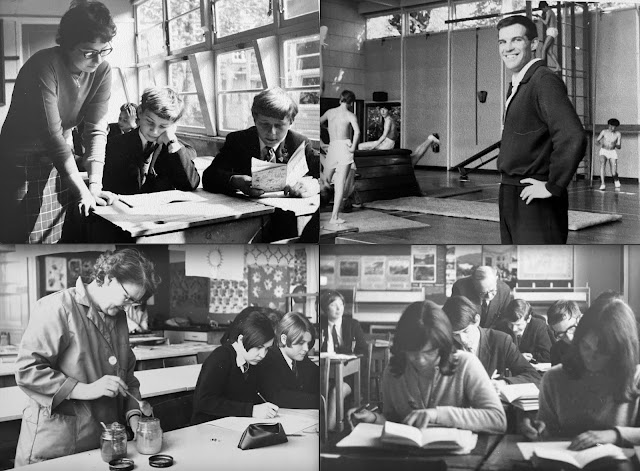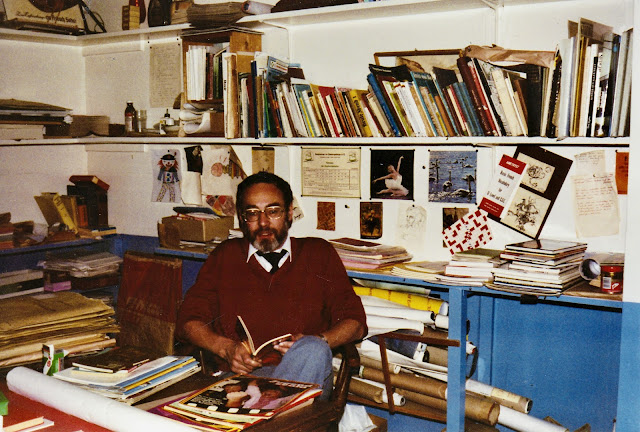1964 and memories of 2A
I'm pleased to be able to share the second part of Dr Stephen Willoughby's recollections of his time at the Gilberd during the 1960s. (You can find an account of his first year in 1963 here.)
Stephen has been kind enough to also share a copy of the programme for the Gilberd 'Presentation of Prizes' event which was then held annually at the end of each school year. The 1964-65 event was held at the ABC Cinema in St John's Street. I've published the programme in full at the end of Stephen's account as it's a small piece of school history.
Do please get in touch if you have any memories or photos of your time at the Gilberd that you'd like to share. You can email us at eddiesphotos@icloud.com
I'll let Stephen take up the story...
After the summer break following the year in 1B we progressed, with the buoyancy and confidence that comes with no longer being newcomers, into our second year. I ended up in 2A together with many of the classmates from my previous form. There were 32 of us altogether.
Our form base was to be the Old Canteen on the lower school site, a long and narrow classroom adjacent to the lower tuck shop and opposite the staff room.
Our form teacher was Mr “Beaky” Howells who seemed to us at the time a particularly stern and very Welsh individual who would tolerate no nonsense. I got to know Beaky in different contexts in later years at the school, and found him to be a kind and generous man with a great sense of humour. It wasn’t until many years later that I realised that his moniker was derived from his initials, B.K. Howells. I was a bit slow like that.
On our first day back we were issued with blank timetables and, under Beaky’s direction, we filled in the details of what we were to be doing and when. There are gaps in my memory of who taught what at the time, but I’m confident about the following: Mrs Moulton, French; Mr Horlock, RE; Jim Wells, History; Beaky Howells, Maths; Mrs Went, Art; Conrad Cole, Music; Mr “Putt” Nunn, Metalwork; Dick Osborne, PE; Andy Stovell, Games. Chemistry, Physics, Biology, English and Geography were also on the timetable, of course, but I can’t remember who took me for those.
The purpose and value of physical education, and in particular games, continued to elude me in those days, but I somehow ended up in the 2nd Year School rugby XV, presumably because they were desperate to make up numbers. My position was Full Back which afforded the opportunity to hang around near the back of the field, pick up the ball if it came my way, and boot it back upfield out of harm’s way. It was the least physical of all the other possibilities, which suited me very well. An eye opener was the singing of ribald rugby songs on the coach when returning from an away match; the teachers didn’t actually join in but seemed happy enough to let us get on with it. The longer the journey, the more adventurous and explicit the lyrics became.
Metalwork was a new adventure for me but which, alas, went the same was as the one I’d had with woodwork. Our instructor was “Putt” Nunn, a diminutive figure who looked out of place among all the thumping, throbbing and grinding machinery in his workshop. During an early lesson he was explaining that sometimes, when welding pieces of work together, it was necessary to apply a little putty. This resulted in fits of giggles from the class who were quick to spot the inadvertent reference to his nickname. Putt had spotted it too, with the comment: “Don’t think I don’t know what you’re laughing at!” I think I managed to make a tin box during my time in Putt’s class; the item fell apart as soon as I took it home. Luckily, I sang in the same church choir as Putt’s brother, Percy Nunn, and was able to use this fact to forge a connection between us and mitigate his opinion of my poor performance.
One of our English teachers, specialising in poetry, was a lady called Miss Neave who introduced herself with the words: “My name is Neave, it’s easy to remember as in ‘Adam an' Eve’ ”. She had a number of unfortunate mannerisms which we took great delight in mimicking behind her back.
From memory, school assemblies were held on Monday and Thursday mornings at St Peter’s Church just over the road and up the hill from the school. Crossing North Hill was a hazardous business which was supervised by Putt Nunn together with a few other members of staff. It was at a time of day when motorists would often show their impatience at being held up, but Putt and his colleagues were resolute in their determination to get us all across the road and back again without incident. The assembly itself was a religious one meant for Anglicans; the few Catholics were catered for separately in a classroom back at the school. The service was generally led by Mr Sprason or Miss Twyman, and there was a hymn, prayers and a reading; school notices were also read out. The school choir (of which I was a member) gathered in the organ loft and led the singing with Conrad Cole at the organ. In the following year I would routinely play the organ before the service began; there is a longer story about that which I will save for my recollections of Year 3.
A similar whole-school event was the annual prize giving which was held in the ABC Cinema located in the town centre.
Like Sports Day, this was a brief but welcome relief from the normal timetable. Prize Giving was quite a spectacular event at which we saw our teachers in a new light, clothed as they were in academic dress which added to their demeanour of authority. I’m not totally sure, but I think Mr Bateman still wore his brown overalls at these events, and the PE personnel attended in their track suits. There was generally a high profile public figure present on these occasions who would give an inspirational address: I have a programme from the November 1965 Prize Giving which shows that Sir William Penney was the guest of honour on that occasion.
The aforementioned annual Sports Day was held at Sheepen Road in the summer term. This is where the school’s House system came into play. On entry to the Gilberd every pupil was allocated to one of the four Houses: Watt (red), Wren (green), Faraday (yellow) or Newton (blue), and it was at Sports Day that the Houses were pitted against each other. Having absolutely no athletic skills to offer, I was alas unable to make any contribution to my House’s (Watt) score but was quite content to cheer participants on from the comfort of the spectators’ area. (I should note here that early on in my physical education I had elected to become a cross country runner: the attraction was that, once out of sight of the teachers, it was possible to sit on a rock or clump of heather for an hour or so before returning, feigning aching muscles, breathlessness and general exhaustion.) There were occasional but infrequent House meetings throughout the year but they generally seemed to have little purpose - to me, anyway.
We had been spared the ordeal of annual exams in our first year, but these became part of the routine cycle of the school year from now on. I hated them, and when I embarked on my own teaching career nearly two decades later I was determined that I would find better ways to assess my students’ progress. Nevertheless, we had to do them, and there was strong competition within each class to be as high up the order as possible. Grades and position in class were recorded on one’s school report issued in July, normally with a perfunctory comment next to each one such as poor, satisfactory, could do better, good or excellent, and with very little opportunity for discussion. The form teacher (Beaky in my case) added a general comment at the end of the report which was meant to summarise their overall impression. Every report was read by the Headmaster (Mr Sprason then) who added a brief comment. They were sent home to be countersigned by a parent.
Finally, this was when we became aware of the power of prefects who were appointed by senior teachers and were mandated to issues lines, detentions and other sanctions as they saw fit. I once fell foul of one prefect who made me write 500 times: “I must not impede the authorised activities of any person, male of female, appointed to represent the Gilberd School while performing their prefectorial duties on any day of the week during the autumn, spring or summer terms in this or any other year while I am a pupil at said school”. That might not be verbatim but it was similarly expansive and was, to my shame, a technique I was tempted to adopt myself when I became a prefect some years later.
Next, 3L in which we really got into our stride!
The four page programme for the 1964-65 'Presentation of Prizes' is reproduced below. Please click on each image for a higher resolution copy of each page.








Comments
Post a Comment